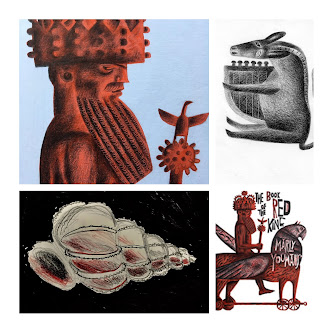1.
Hurrah for reviews!
At The Wine-Dark Sea, Melanie Bettinelli has published a long, thoughtful review of
Charis in the World of Wonders that dives into wonders, grace, character oppositions (sometimes as structure), transcendentals, freedom, language, narrative mode, variation in "Puritan" thought among late seventeenth-century characters, the wilderness, and beauty. I'm glad that she found something very different from what she expected, and that she tells us about what she did find with such care. Every writer wants reviews that explore a book and extend a reader's sympathy to its aims, and this extended treatment is just that.
A couple of clips:
The period vocabulary never feels forced or strange not like a gimmick; but rather, like a key that unlocks the door into the past. The novel never makes the mistake of imbuing the heroine with an anachronistic worldview that will be more familiar and safe for the 21st century reader. Rather, it invites us to enter in to Charis’ world of wonders, a place rich and strange and not always comfortable, a true foreign country and not at all like my current day Massachusetts.
I’m not usually a fan of first person narration, but Charis employs it to good effect. The novel is as much a portrait of a soul as the story of a journey and the exploration of a time and place. Charis’ internal life is rich and poetic, informed by the poetry of Anne Bradstreet, the Bible, and the classical literature to which her father has introduced her— she’s studied Greek and Hebrew alongside her brothers. Youmans is a poet and Charis’ narration is thick with metaphor and imagery and the language often has the heightened quality of poetry. But it never feels overwrought or strained. Rather it feels like the very texture of the thoughts of a highly literate woman who, formed by all she has read, sees the world through a lens of language and metaphor.
Charis means grace and this book is very much about the movement of grace in a fallen world of sin. I was surprised at how much the novel’s worldview was imbued with faith— you don’t often find that kind of faith— simple, unalloyed with skepticism and untainted with hypocrisy— in contemporary literary novels. What’s more, in addition to the expected faith that had the familiar “Puritain” strains of fascination with sin, the devil, witchcraft, and hellfire; Charis also has a faith that is more familiar to me: one that is infused with a deep awareness of grace and mercy of a loving God. Certainly Charis is aware of those in her community who emphasize sin and the presence of the devil, but her personal vision of God is as a God of wonders, a God of love and mercy. And much of the drama and beauty of the novel is watching her navigate between those different worldviews (the Satan-haunted and the grace-haunted) which are both present not only in Charis herself but also in her community.
There's a great deal more, so please
fly here to read more. I don't usually see reviews that talk about faith animating a character, about the structural use of oppositional characters, or about the world (as in her treatment of Hortus) as a symbolic place. And as I have long loved Hawthorne, I was pleased to see that she tackles the book's relationship to works like
The Scarlet Letter: "a very different thing, going in a 180 degree different direction."
* * *
2.
#pandemicbooklaunch
A few comments plucked from the past five days...
two writers, one actor, one painter...
on twitter and facebook...
used by permission
sebastien doubinsky @sebdoubinsky: I absolutely love @marlyyoumans's universe. If you don't know it yet, you should really give it a try. Beautiful, magical and thought-provoking. 9 June 2020
Chris Phillips @MobyProf: A bit of a sequel to my tweet a couple of weeks ago about my latest book-buying: @marlyyoumans’ Charis in the World of Wonders is THAT GOOD. The pacing is masterful, the world is pungent & tangible, & Charis’s inner life is exquisitely done. Thank you, Marly! 8 June 2020
Patricia Heaton @PatriciaHeaton: I’m loving your book "Charis in the World of Wonders!" What a unique voice you've created! 4 June 2020
Mary Bullington, painter and poet: Last night, I started Marly Youmans’ new novel, “Charis in the World of Wonders" and was 63 pages deep when I made myself turn off the light. In midst of an Indian attack on her tiny Puritan settlement in the spring of 1690, a teenager begins to tell her life story, even as she makes a harrowing escape into the forest with her 7-year-old sister. Charis's lens on the events and people of her time is devastating. At once innocent and clear-sighted, she speaks to all that she sees, imagines, and feels. Parts read as though Goya’s Disasters of War --“This I saw”-- were told not by a mature and cynical court painter, but by a devout, well educated young woman who has no choice but to observe and participate. 9 June 2020
3.
 |
| Image by Lizza Littlewort |
The second of the "smalls and tinies"
(fictions and fiction-like pieces)
out or forthcoming at The North American Anglican
over ten months
And if you're interested in current online poems, look through recent posts...



